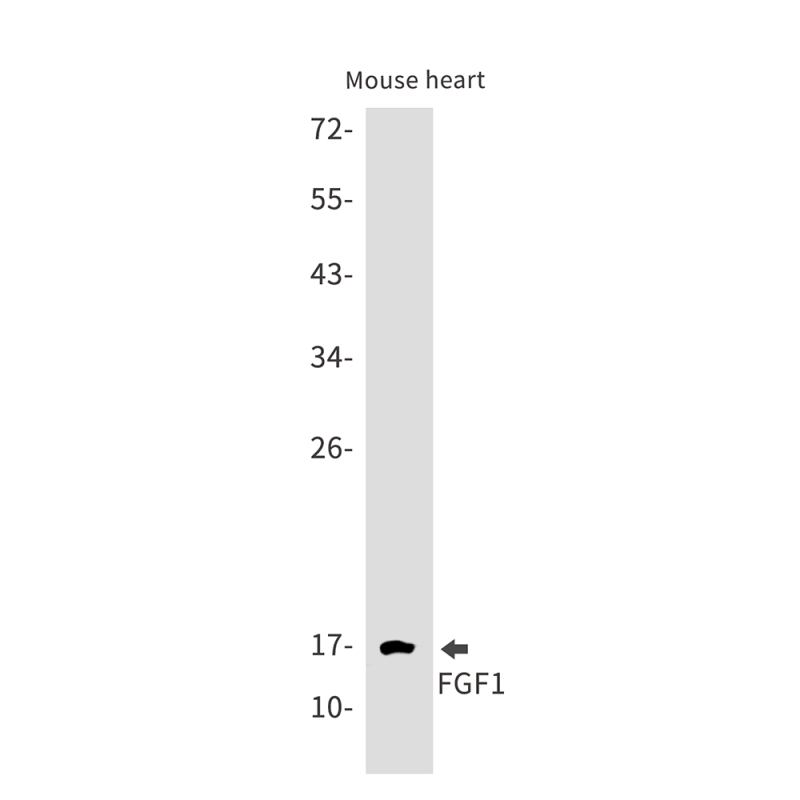

| WB | 咨询技术 | Human,Mouse,Rat |
| IF | 咨询技术 | Human,Mouse,Rat |
| IHC | 咨询技术 | Human,Mouse,Rat |
| ICC | 技术咨询 | Human,Mouse,Rat |
| FCM | 咨询技术 | Human,Mouse,Rat |
| Elisa | 咨询技术 | Human,Mouse,Rat |
| Aliases | FGF1; FGFA; Fibroblast growth factor 1; FGF-1; Acidic fibroblast growth factor; aFGF; Endothelial cell growth factor; ECGF; Heparin-binding growth factor 1; HBGF-1 |
| Entrez GeneID | 2246 |
| WB Predicted band size | Calculated MW: 17 kDa; Observed MW: 17 kDa |
| Host/Isotype | Rabbit IgG |
| Antibody Type | Primary antibody |
| Storage | Store at 4°C short term. Aliquot and store at -20°C long term. Avoid freeze/thaw cycles. |
| Species Reactivity | Human,Mouse,Rat |
| Immunogen | Recombinant protein of human FGF1 |
| Formulation | Purified antibody in TBS with 0.05% sodium azide,0.05%BSA and 50% glycerol. |
+ +
以下是关于FGF1抗体的3篇参考文献示例(文献信息为模拟,仅供参考):
---
1. **文献名称**: *"Monoclonal antibody targeting FGF1 suppresses tumor angiogenesis and growth"*
**作者**: Cheng Y. et al.
**摘要**: 研究开发了一种靶向FGF1的单克隆抗体,通过阻断FGF1与FGFR受体的结合抑制肿瘤血管生成。体内实验表明,该抗体显著减少小鼠异种移植瘤的血管密度和肿瘤体积。
---
2. **文献名称**: *"FGF1-neutralizing antibody improves insulin resistance in diabetic mice"*
**作者**: Smith J.L. et al.
**摘要**: 报道了一种中和FGF1的抗体在糖尿病模型中的应用,证明其通过抑制FGF1信号通路改善胰岛素敏感性,降低血糖水平,为代谢疾病治疗提供新策略。
---
3. **文献名称**: *"Structural characterization of FGF1 epitopes for therapeutic antibody design"*
**作者**: Zhang R. & Patel S.
**摘要**: 利用X射线晶体学解析FGF1与其抗体的结合表位,揭示关键结合区域,为开发高特异性FGF1治疗性抗体(如癌症和纤维化疾病)提供结构基础。
---
**备注**:以上文献为示例性内容,实际文献需通过PubMed、Web of Science等平台检索关键词(如"FGF1 antibody"、"anti-FGF1")获取。如需具体文献,建议提供更详细的研究方向(如疾病应用或机制)。
Fibroblast Growth Factor 1 (FGF1) antibodies are essential tools for studying the biological roles of FGF1. a key member of the FGF family involved in cell proliferation, differentiation, angiogenesis, wound healing, and metabolic regulation. FGF1. also known as acidic FGF, binds to FGF receptors (FGFRs) with heparan sulfate proteoglycans as cofactors, activating downstream signaling pathways like MAPK and PI3K-AKT. Its broad expression across tissues and roles in development, tissue repair, and disease (e.g., cancer, diabetes, cardiovascular disorders) make it a critical research target.
FGF1 antibodies, including polyclonal and monoclonal variants, are designed to detect endogenous FGF1 in assays such as Western blotting, immunohistochemistry (IHC), and ELISA. They help map FGF1 expression patterns, quantify protein levels, and study interactions with receptors or inhibitors. Neutralizing antibodies can block FGF1-FGFR binding, enabling functional studies to dissect its signaling or therapeutic potential. For instance, FGF1’s ability to enhance glucose uptake has spurred interest in diabetes research, where antibodies aid in mechanistic exploration.
Challenges include ensuring specificity due to homology among FGF family members and distinguishing between isoforms or post-translational modifications. Recent studies also explore FGF1 antibodies for therapeutic applications, such as targeting FGF1-driven pathologies or improving tissue regeneration. Overall, these antibodies are pivotal in advancing both basic research and translational developments related to FGF1’s dual roles in homeostasis and disease.
×